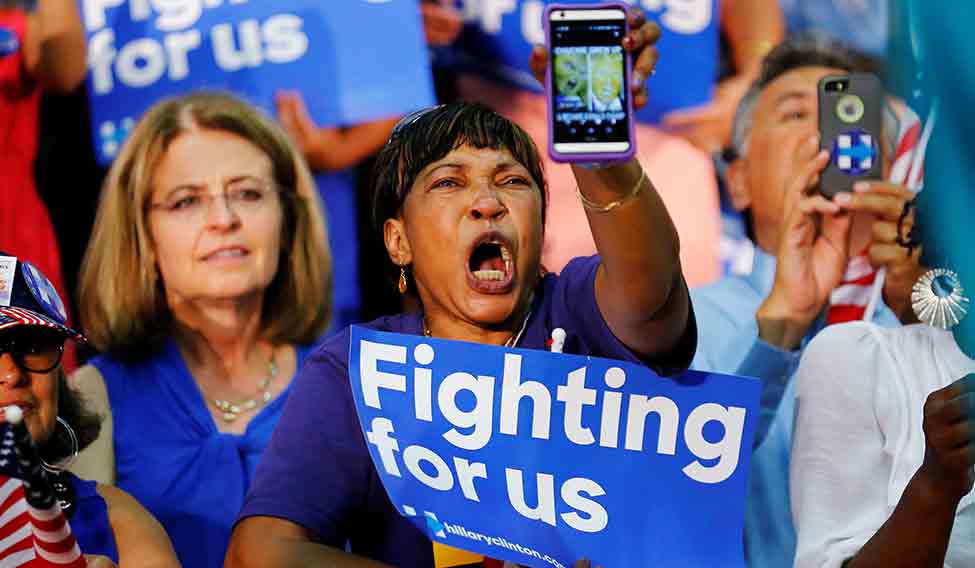A month ago, Donald Trump, the presumptive Republican nominee for president, gave an interview to a prominent American news channel. When asked about his understanding of Russia, he replied, “I know Russia well. I had a major event in Russia two or three years ago, [the] Miss Universe contest, which was a big, big, incredible event.” No one seemed shocked as it came from Trump. What is probably shocking is that most opinion polls now show that Trump is running neck-and-neck with Hillary Clinton, the leading Democratic contender.
As one travels across the US, it is hard to miss the groundswell of support for Trump, especially among poor, white men, without a college degree. In Las Vegas, I met a group of young white Americans as they stepped out of one of the numerous casinos that dot the city. They were all unabashed about their admiration for Trump. What surprised me the most was that they were largely clueless about his policies or even the pressing problems facing the United States. For them, what mattered was that Trump took the lead to expose and express several points which had been suppressed so far for the sake of political correctness. There seems to be a perceptible wave among white blue-collar workers—who were never excited about elections in the past—in support of Trump. For many of them, Trump is talking in a language that they can understand and identify with.
Unsurprisingly, some of Trump’s most controversial proposals, like banning the entry of Muslims into the US and building a wall on the border with Mexico, have met with a great deal of support among his core constituency. Trump's success lies in his ability to tap into the frustration of the masses with their political leaders and institutions. People from cab drivers to waitresses shared their anxiety of being on a treadmill for the past several decades, working several jobs at one time, but not seeing their real wages increase, although the US economy has been doing fairly well. The White House will tell you that inflation is at 1.1 per cent and unemployment rate is as low as 4.7 per cent. Yet, the positive effects are not percolating down to the poor. Employers, for instance, added only 38,000 jobs in May as job creation fell to its lowest level in more than five years. The median wage has been stagnant over the past several decades and the gulf between the richest and poorest classes has been growing.
 Making a point: A Hillary supporter shouts anti-Trump slogans even as Hillary speaks during a campaign stop in Fresno, California | Reuters
Making a point: A Hillary supporter shouts anti-Trump slogans even as Hillary speaks during a campaign stop in Fresno, California | Reuters
Naturally, many Americans feel left out from the country’s prosperity. College graduates whom I spoke to seemed angry at the ballooning tuition debt and no reasonable job prospects. It is this anger and frustration of the average voter that is the key dynamic of the ongoing presidential race. Insurgent candidates from both parties—Trump and the far-left-leaning socialist candidate from the Democratic party, Bernie Sanders—have been working on tapping this anger. No wonder, Trump and Sanders have similar views on a number of issues like wage inequality, trade agreements, outsourcing and Wall Street bashing.
While Trump succeeded on the right by positioning himself as an outsider, Sanders was not able to pull off the same strategy because of lack of support in key democratic constituencies such as African Americans and Hispanics, who voted overwhelmingly for Hillary Clinton. Hillary in any other election cycle would have been considered a pathbreaking candidate because of being a woman with so much experience. In this election, however, her favourability ratings are rather low on account of the insurgent mood among the voters. Her centrist policies are perceived to be more establishment oriented, and the mood of the voters seems to have forced her to take a left turn on several issues, including free trade.
President Barack Obama, who came to power when the US was hit by the 2008 economic meltdown, has been much more global in his economic policies. He has argued for newer trade treaties, has permitted more foreign students who graduate in the STEM (science, technology, engineering and mathematics) stream to spend an extra year in the country to find work and pursue research. He has also opposed the moves to reduce long-term employment visas under the H-1B category for skilled workers. Obama has pushed hard for American students to pursue degrees in science and mathematics, and has made affordable college education a major pillar of his education policy. Hillary has promised a large degree of continuity of the economic and foreign policies of Obama, though she has emphasised more support to working men and women as well as for children.

Some of the political messages of Trump and Sanders directly conflict with how America became the preeminent power in the world. An open immigration policy, for instance, has helped develop technology centres such as Silicon Valley, contributed to developing the world’s best universities and created much diversity, visible in cities like New York and San Francisco. With immigration came high-paying jobs and increased tax collection. Enforcing a stricter immigration policy through reducing the number of H-1B visas, increasing the resultant costs of visas and requiring students to leave the country after studies can threaten economic progress. Colleges will not be able to fill their seats and there are too few Americans to meet the demands of high-skill jobs.
Trump and his supporters allege that immigration hurts job prospects of US citizens and brings down wages. Throughout the election season, he has been spewing venom against Hispanic immigrants, raising concern among the Republican establishment that the effect of Trump's demagoguery could last beyond this election season. Mitch McConnel, majority leader in the US Senate, said Trump could push Hispanics away just like Republican candidate Barry Goldwater alienated African Americans during the 1964 elections. Goldwater’s opposition to the civil rights bill drove African Americans away from the Republican party, and the rift remains to this day. Goldwater, incidentally lost in a landslide, winning just six of 50 states.
Apart from immigration, outsourcing of manufacturing and service jobs to low-cost countries is a critical issue. Over the last three decades, several large US corporations have opened major offshore centres. Companies such as IBM, Oracle and Accenture employ around one lakh persons each in their centres in India. The campaign trails have witnessed promises to return these jobs to the US and to penalise companies that outsource to developing countries. It would, however, be difficult given the significant economic benefits of outsourcing. For example, according to a report by the Tufts Center for the Study of Drug Development, the development of a drug in the US can take more than ten years and cost more than $2.5 billion. It is cheaper and more efficient to perform these activities elsewhere.
 A Sanders supporter dancing at a campaign event in Monterey, California | Reuters
A Sanders supporter dancing at a campaign event in Monterey, California | Reuters
While companies need outsourcing to be competitive in the US, high-value functions are performed within the country. Moreover, profits from offshore operations find their way back to the US. Take the example of iPhone. While it costs a little over $200 to make an iPhone 6s, it retails at about thrice that cost. The US industry saves more than $300 billion a year through outsourcing, though many technology firms in India are now taking advantage of the investment climate to set up technology centres in the US and give employment to Americans.
While both Sanders and Trump are exploiting the anger, their solutions are likely to make it worse. For example, Sanders's proposal for free college tuition could further increase the already unsustainable fiscal deficit. Protectionist policies could ignite trade wars with China and South America, hurting American consumers and the world at large.
As I drove from Las Vegas to the Grand Canyon in Arizona, my chauffeur and guide, Clarence 'Bones' Adams, told me how Americans over the years had lost out culturally and had forgotten what made the US the greatest country in the world. Adams, a former world boxing champion, said it was reality shows that kept most Americans enthralled these days. And, he did not invest much hope in the upcoming elections. “Neither Trump nor Hillary excites me. I am not going to vote for any of them,” said Adams. “I think Trump has an opportunity to become president, because America has become like a circus. And that's all we have running for president, clowns.”
It is possibly a sign of the times that Trump and Hillary, the leading candidates, have the worst net favourability ratings of approximately -20 per cent in modern times. All candidates in recent history had positive net favourability ratings. McConnel was stating the obvious when he said the 2016 elections would be a choice between two very unpopular candidates.







